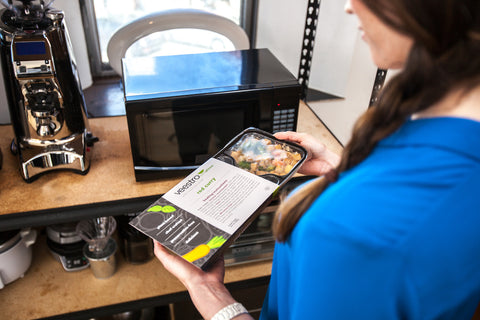Microwaves and nutrition: do microwaves kill our food?
Let’s talk microwaves. They’ve received a bad rap over the years, due to claims stating that they completely kill our food and zap all of the nutritional value out of the foods we eat. But what’s the deal? Are microwaves really that bad?
We’re breaking down everything you need to know about microwaving your food:
How Do Microwaves Even Work?
If you’ve ever wondered how a microwave can magically heat up your meal in under a minute, it all has to do with the science of how they work.
Microwave ovens work by turning electrical energy into electromagnetic waves. These electrical waves then stimulate certain molecules in the food you are reheating, creating energy and thus heat. Voila! Your dinner from last night is reheated in no time.
Nuking Our Foods…is it Really That Bad?
Is it really true that microwaves are killing our food? No, not necessarily (phew!)
The truth is that every form of cooking, including sautéing, boiling, and slow cooking is going to reduce some of the nutritional content of what we eat.
However, one big positive thing about microwaving is that cook times are typically short and the temperatures used are generally low. For these reasons, microwaving your food may actually be better in the sense that more of the nutritional value in your meal would be retained as opposed to longer slow cooking or baking times. Click here to browse 50+ plant-based chef crafted meals.

Vitamin C is just one of those nutrients that has been found to be preserved in microwaved cooked foods as opposed to foods cooked using higher heat and longer cook times. So, here’s one reason microwaving your food may actually be a good idea.
Read more about Myth vs Fact: 5 things you didn't know about Vitamin C.
Another big perk? Microwaving has been found to preserve antioxidants in various vegetables better than other methods of cooking like boiling. And, speaking of boiling. While many people may think boiling or steaming their veggies is an ideal cooking method, the truth is that you leave many of the nutrients behind in the pot of water. In fact, when boiling spinach, you can lose a whopping 70% of the folic acid content. By microwaving with just a small amount of water, you completely avoid this issue.
Studies have also found that microwaving may block the formation of certain harmful compounds in foods like nitrites.
The Bottom Line
So, to microwave or not to microwave, that is the question.
While many microwaves have received a bad rap for zapping nutrients out of the foods we eat, fear not. We don’t have to believe all the hype that microwaving is terrible for us.
Microwaving your food isn’t reducing the nutritional content of your food any more than steaming those veggies. In fact, it may actually be keeping more nutrients in all that plant-based goodness you add to your plate.
So, the bottom line? Don’t fear the microwave! Not only is it a highly convenient way of cooking your food, it may just be one of the better ways to get the most nutritional value out of the foods you eat.
Check out Veestro's plant-based and chef-crafted meals, prepared with organic ingredients, preservative-free.

